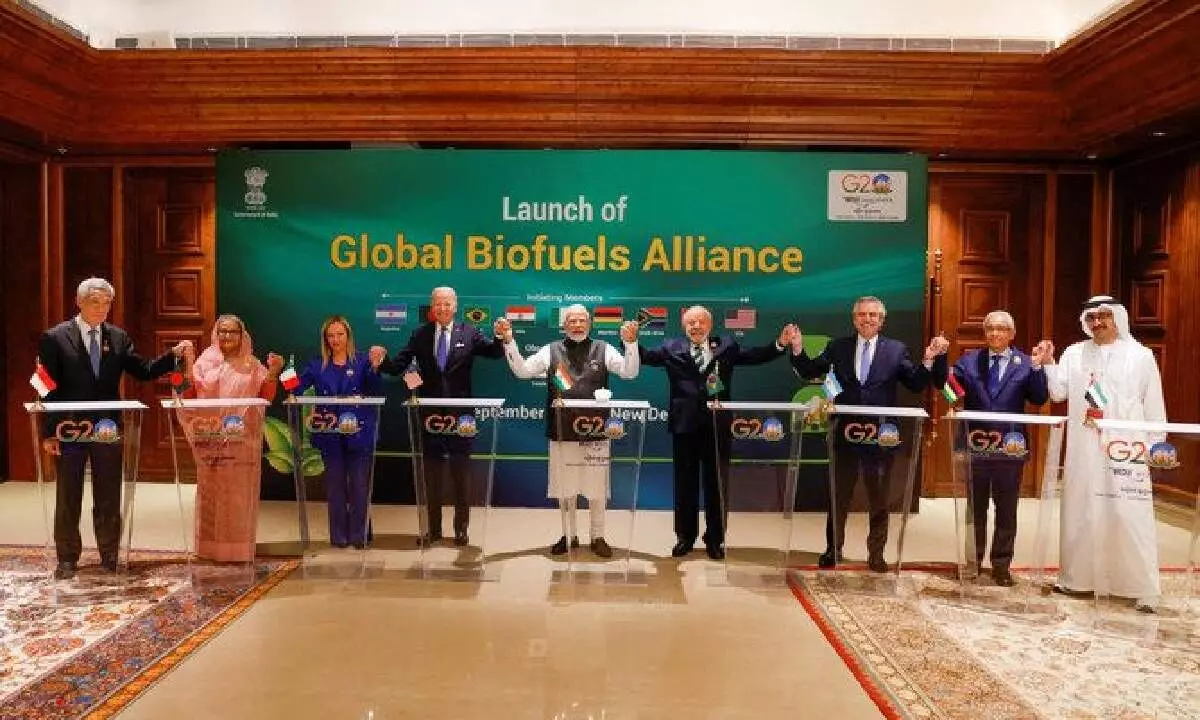Global Business Alliance aims to triple biofuel production by 2030
India hopes to be carbon neutral by 2070; use biofuel in transport sector
image for illustrative purpose

Global energy sector has witnessed a historic moment today with the announcement of the Global Biofuels Alliance (GBA) on the sidelines of the G20 summit to boost the use of cleaner fuels. The alliance, with the United States and Brazil as its founding members, will accelerate global efforts to meet net zero emissions targets by facilitating trade in biofuels derived from sources including plant and animal waste.
GBA will support worldwide development and deployment of sustainable biofuels by offering capacity-building exercises across the value chain, technical support for national programs and promoting policy lessons-sharing. It will facilitate mobilizing a virtual marketplace to assist industries, countries, ecosystem players and key stakeholders in mapping demand and supply, as well as connecting technology providers to end users. It will also facilitate development, adoption and implementation of internationally recognized standards, codes, sustainability principles and regulations to incentivize biofuels adoption and trade.
The IEA recently presented key findings from its new report, Biofuel Policy in Brazil, India and the United States – Insights for the Global Biofuel Alliance, at a special meeting of government ministers convened at the G20 Energy Transitions Ministerial Meeting, which identified ‘Fuels for the Future’ as a priority area.
More than a dozen energy ministers participated in the event held in Goa, including Argentina, Bangladesh, Brazil, Canada, Italy, Kenya, Mauritius, Paraguay, Seychelles, the United Arab Emirates, Uganda, the United States and host India in addition to heads of nine international organisations.
The meeting included discussions on India’s proposed Global Biofuel Alliance, which seeks to accelerate sustainable biofuels deployment in support of the global energy transition. Participants acknowledged the critical role sustainable biofuels can play in reducing greenhouse gas emissions. The IEA estimates that global sustainable biofuels production would need to triple by 2030 to put the world’s energy system on track towards net zero emissions by 2050.
The International Energy Agency estimates in a July report that global sustainable biofuels production would need to triple by 2030 to put the world's energy system on track towards net zero emissions by 2050.
Liquid biofuels provided more than four per cent of total transport energy supply in 2022, but their deployment is not accelerating fast enough. Moreover, more than 80% of total biofuel production occurs in just a few countries, despite vast unlocked potential in many parts of the world. Deployment is constrained by challenges such as the availability of the feedstock used to make biofuels, the lack of consensus on sustainability criteria, and the pace at which related technology has been commercialised.
The global ethanol market was valued at $ 99.06 billion in 2022 and is predicted to grow at a CAGR of 5.1% by 2032 and surpass $162.12 billion by 2032. As per IEA, there will be 3.5-5x biofuels growth potential by 2050 due to Net Zero targets, creating a huge opportunity for India.
India has been pushing the idea of setting up a Global Biofuels Alliance to help accelerate energy transition. India is targeting to become carbon neutral by 2070 and is expanding use of biofuel in its transport sector.
It has advanced the deadline by 5 years to 2025 for doubling nationwide ethanol blending in gasoline to 20%.
Bio-energy or biofuel is generated from agricultural and organic materials called ‘biomass’. Its utilization can help reduce emissions and enable countries across the globe to reach their net zero carbon emissions.
India achieved 10% ethanol blending target 5 months in advance in June 2022 while availability of E20 blended petrol was also advanced to 2025, five years ahead of the originally planned 2030. In fact 20% ethanol blended fuel is already available across 1650 bunks.
India’s ethanol demand is poised to grow to 10.16 billion litres by 2025. Towards realising this, 12 commercial plants and 10 demonstration plants of 2G biorefineries (using agricultural waste) have already been proposed.

